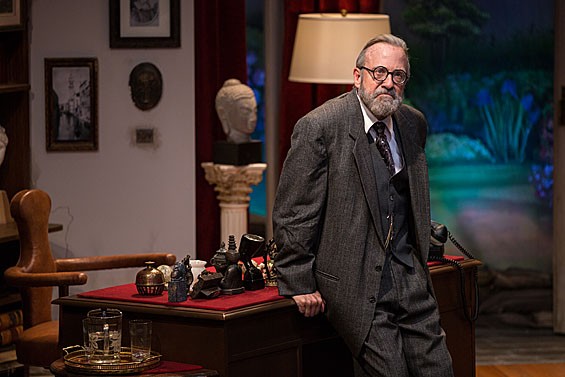The French author Jules Renard was ever quick with a quip. Among his many epigrams, Renard wrote, "I have a passion for the truth and for the fictions that it authorizes." In imagining a meeting that never occurred between Sigmund Freud, the atheistic father of psychoanalysis, and author C. S. Lewis, a zealous convert to Christianity, Mark St. Germain's fictional Freud's Last Session addresses the fundamental truth that not even the most fervent minds can answer life's ultimate question: Does God exist?
For 75 civilized minutes Freud and Lewis engage in a genteel debate about belief systems and worldviews. According to this scorecard, Lewis uttered the more compelling ideas ("I'll be the first to admit that the greatest problem with Christianity is Christians," "Why is it religion makes room for science, but science refuses to make room for religion?"), while Freud had the more compelling personality.
This fanciful meeting (currently presented by the Repertory Theatre of St. Louis as part of its Studio series) occurs in Freud's London apartment in September 1939, fifteen months after Freud had escaped from Vienna to avoid Nazi persecution. Although the war has caught up to him — outside the apartment, sandbags guard against the German Luftwaffe's impending bombing of Britain — the apartment itself provides a touch of Old World elegance: Oriental rugs, Greek, Roman and Egyptian artifacts, thick maroon drapes. (A highly effective scenic design by Peter and Margery Spack.)
Viewers who are attracted by discourse in the guise of drama likely will be captivated by the ideas that ricochet across the walls of this ornate apartment. Those who enjoy actual drama with their drama might find so much talk tedious. With little flesh on the pages of this script, it is left to the two actors (under the direction of Michael Evan Haney) to rise to the challenge of bringing their characters to vigorous life. This they do.
Barry Mulholland's Freud and Jim Butz's Lewis provide an intriguing study in contrasts. Freud is bearded with glasses; his hands quiver, his spine is so slouched as to resemble one of the monkeys championed by his "personal saint," Charles Darwin. Lewis is ramrod straight, clean-shaven and apparently gifted with 20-20 vision. Whereas Freud uses his gnarled fingers to prop himself up at his desk, Lewis' hands are usually in his pockets or clasped in an almost military pose. At age 83, Freud is at that point in life when he no longer counts his tomorrows. Lewis is only 40; his greatest successes are still in the future. Perhaps this is why Butz's Lewis sometimes feels more like a respectful audience than an equal combatant. Small smiles of accomplishment steal across his face whenever he scores a point against his more renowned adversary.
By setting Freud's Last Session on September 3, 1939, the same day that England declared war with Germany, perhaps the playwright is trying to contrast the decorum that attends civilized debate with the senseless slaughter that accompanies war. And indeed, the play's most dynamic moments are triggered by the looming state of emergency. Curiously, author St. Germain chose to conclude his play with a snippet from the radio transcription of King George VI announcing England's declaration of war with Germany, a speech that — when Freud's Last Session debuted off-Broadway in July 2010 – was little remembered. Five months later, the motion picture The King's Speech would transform that address (delivered by Colin Firth) into a wrenching emotional experience. Hearing a few of those same halting sentences at the end of Freud's Last Session almost becomes a distraction, for we are reminded that an evening thick with personal truths has been mostly devoid of feelings.
Editor's Note: Riverfront Times has an immediate need for a freelance writer to pen weekly theater reviews for the print and online editions of the RFT and coordinate our performing arts coverage. Interested candidates should e-mail a résumé and clips (subject line: "theater critic") to [email protected].


